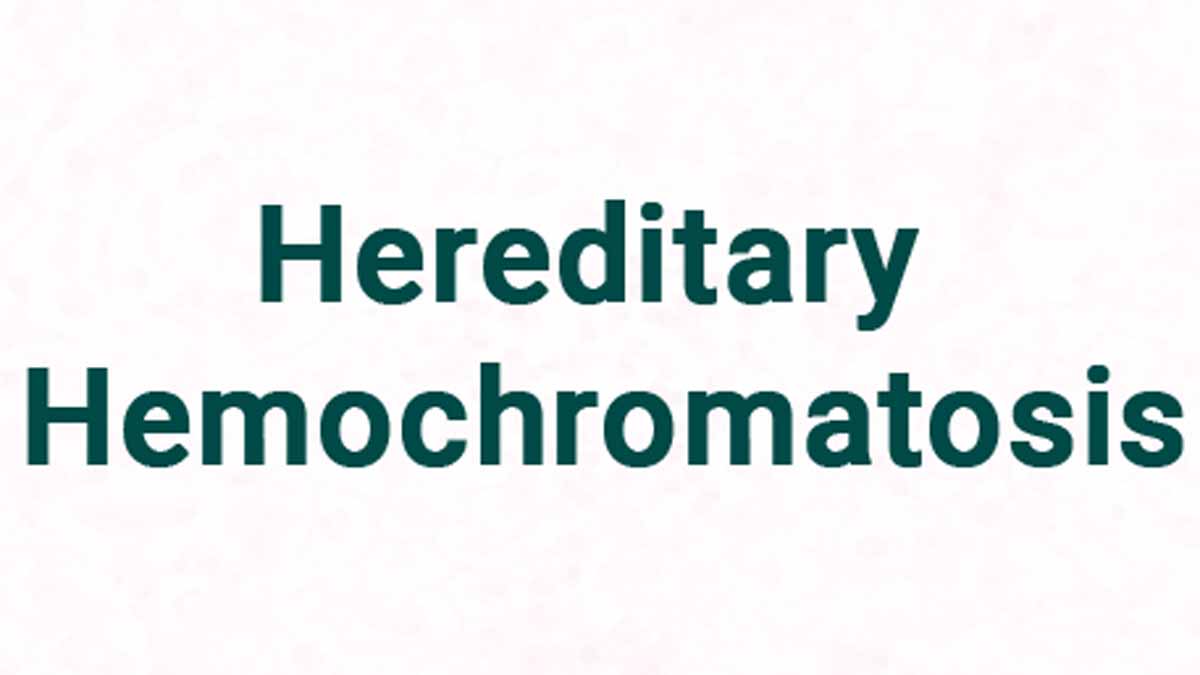- Home
- Editorial
- News
- Practice Guidelines
- Anesthesiology Guidelines
- Cancer Guidelines
- Cardiac Sciences Guidelines
- Critical Care Guidelines
- Dentistry Guidelines
- Dermatology Guidelines
- Diabetes and Endo Guidelines
- Diagnostics Guidelines
- ENT Guidelines
- Featured Practice Guidelines
- Gastroenterology Guidelines
- Geriatrics Guidelines
- Medicine Guidelines
- Nephrology Guidelines
- Neurosciences Guidelines
- Obs and Gynae Guidelines
- Ophthalmology Guidelines
- Orthopaedics Guidelines
- Paediatrics Guidelines
- Psychiatry Guidelines
- Pulmonology Guidelines
- Radiology Guidelines
- Surgery Guidelines
- Urology Guidelines
Management of hereditary hemochromatosis- New guidelines released by American college of gastroenterology

First-degree relatives of hereditary hemochromatosis patients must be screened for the disease, recommend new ACG guidelines. The American college of gastroenterology has released new guidelines for the treatment of hereditary hemochromatosis (HH). The guidelines were published in the American Journal of Gastroenterology.
Hereditary hemochromatosis is a genetic disorder which causes malfunction of hepcidin, a key iron regulator in the body, which leads to excessive intestinal absorption of iron resulting in an increased total serum iron level in the body. Humans and other animals do not have the mechanism to excrete this excess iron level. This excess iron level in the body gets stored in the tissues and organs and disrupt their normal function. Organs which are most damaged are liver, adrenal glands, heart, skin, gonads, joints, and the pancreas; this is manifested in the form of cirrhosis, polyarthropathy, adrenal insufficiency, diabetes, and even heart failure. The primary goal of this guideline is to aid the identification of patients before the end-organ injury and initiation of treatment via iron depletion before irreversible end-organ damage.
The key points that the guidelines extensively discuss are clinical features, diagnosis, treatment, transplantations, and prognosis. The recommendations provided by the guideline are as follows.
- The guidelines recommend that family members, particularly first-degree relatives, of patients diagnosed with HH should be screened for HH (strong recommendation, moderate quality of evidence).
- It suggests against the routine surveillance for HCC among patients with HH with stage 3 fibrosis or less (conditional recommendation, very low quality of evidence).
- It recommends that individuals with the H63D or S65C mutation in the absence of C282Y mutation should be counseled that they are not at increased risk of iron overload (conditional recommendation, very low quality of evidence).
- The guidelines do not suggest further genetic testing among patients with iron overload testing negative for the C282Y and H63D alleles (conditional recommendation, very low quality of evidence).
- A non–contrast-enhanced MRI in conjunction with the software used for the estimation of HIC (i.e., MRI T2*) should be used to noninvasively measure liver iron concentration in the non-C282Y homozygote with suspected iron overload. If there is a concomitant need to stage hepatic fibrosis or evaluate for alternate liver diseases, then a liver biopsy is the preferred method (conditional recommendation, low quality of evidence).
- Phlebotomy should be used as the first-line treatment in patients diagnosed with HH, as determined by C282Y homozygosity or C282Y/H63D compound heterozygosity (strong recommendation, moderate quality of evidence).
- The guidelines do not chelation as the first-line therapy for HH, given the effectiveness of phlebotomy, the associated side effects of chelation including hepatic and renal toxicity, and the relatively small sample size of clinical trials supporting chelation (strong recommendation, low quality of evidence).
- The guidelines recommend the use of iron chelation for the treatment of HH for the patient who is intolerant or refractory to phlebotomy or when phlebotomy has the potential for harm, such as in patients with severe anemia or congestive heart failure (strong recommendation, low quality of evidence).
- The guidelines recommend against the routine use of PPIs as the primary treatment of HH (strong recommendation, low quality of evidence).
- LT be should be used in patients with HH who have decompensated cirrhosis or HCC (strong recommendation, low quality of evidence).
To read the full guideline, click on the link a
doi: 10.14309/ajg.0000000000000315

Disclaimer: This site is primarily intended for healthcare professionals. Any content/information on this website does not replace the advice of medical and/or health professionals and should not be construed as medical/diagnostic advice/endorsement or prescription. Use of this site is subject to our terms of use, privacy policy, advertisement policy. © 2020 Minerva Medical Treatment Pvt Ltd